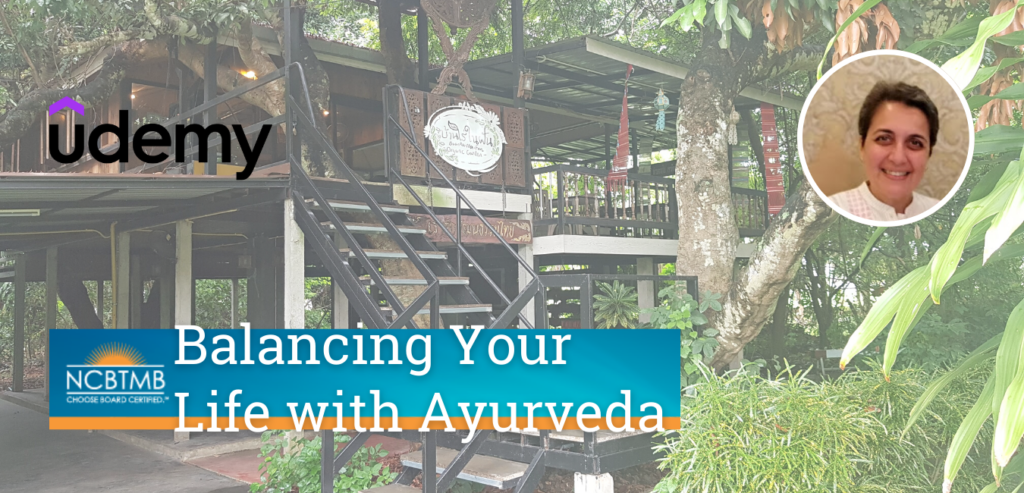Ayurveda in your Daily Life
By Ashwin Sirinthipaporn
Last Updated: 02/02/2024

Ayurveda is an ancient Indian wisdom that has been passed on from generations to generations through sages and, ultimately, through the Vedas (click here for a brief history on Ayurveda). This wisdom states that all aspects of your life affect your health and wellbeing – from diet to lifestyle, to sleeping patterns, to thoughts, and even to the stars that we aligned when you were born (Vedic Astrology is a vast body of knowledge on its own, if you are interested).
However, even though the texts and scriptures are very thorough and expansive, one can easily incorporate certain practices in their daily life that could help them “balance the Elements” through Ayurveda without having to be an Ayurveda Practitioner. Here are some of the ways that I personally fall back to (being an Ayurveda Practitioner’s son has its advantages!) when I feel like my health and wellbeing are not in its optimum condition.
Eating at the "right" time
From what I remember while growing up, we would eat dinner before 6 or 7pm. That was one the first things that my mom instilled in the household. It made a difference. We started losing the extra pounds, slept better and felt more active overall. Now, it’s based on more awareness. When the body feels hungry, I respect its signs and eat. But it didn’t happen overnight. I love experimenting with ideas and, one day, it just popped in my head if I should skip breakfast.
Ayurvedically, it made sense since the digestive fire in our stomach is the most active between 10am and 2pm. I gave it a try and felt good with it and now it’s a part of my routine. This doesn’t mean that I have completely stopped eating breakfast. From time to time, I get hungry in the morning, especially if I had something light for dinner the night before. It’s not a hard and fast rule.
With our lifestyles becoming more and more hectic, we tend to not listen to the body’s calls, especially with food. That’s why having a set routine of breakfast, lunch and dinner helps with making it a subconscious decision rather than a conscious one. Try eating consciously for a week and if it suits you, great! If not, stick to the routine that suits you or try something different.
Ayurveda embraces individuality and uniqueness and so it is entirely up to you what suits your lifestyle, health and wellbeing.

Sleeping at the "right" time

This is one of the hardest things to do, personally. With phones and tablets within a finger’s reach away, one can easily get sucked into endless scrolling and lose sense of time. But knowing that your cells repair itself from the day’s wear and tear between 10pm to 2am can create just enough motivation to get your sleep in.
According to Ayurveda, the body’s Fire Element is active during this time, similar to the one in the afternoon (mentioned above) but the key difference is that during the night, it’s the cells digestive fire that is activated rather than the stomach’s (in Ayurveda, the stomach’s digestive fire is called ‘Agni’, literally translated to ‘Fire’). Hence, when you are fast asleep before 10pm, the body has the opportunity to repair itself using the activated Fire Element in its cells.
I acknowledge that sometimes this is very tough to do since we have deadlines and assignments to complete to ensure we keep our jobs and sometimes we do need to finish these tasks before the next day. It’s not a problem if you sleep late once or twice a week but if it starts becoming a habit, then you may start seeing signs.
Personally, if I sleep late for two to three nights in a row, I develop a runny nose throughout the day. That’s when I know that I need to get my sleep in. Being aware of what signs your body gives can help you to take the necessary action to fix what’s going wrong.
Monitoring our thoughts
Our thoughts can bring about changes in our physical body. I have experienced this personally and I feel it may be one of the biggest things that can have an effect on our health and wellbeing.
One of the biggest feelings that can get your body to malfunction is prolonged guilt, in my opinion. Having guilt is a good mechanism to indicate that you have done something wrong and so you won’t do it again. But having that prolonged feeling of guilt can lead you to be so afraid of making mistakes that you just won’t take the next step. Guilt can really lead to moments of analysis paralysis and it usually comes up in a very subtle manner. A small voice in the middle of the day might say “You were supposed to wake up earlier” or “The work could have been finished today” or “How can you be so lazy?”. These thoughts can lead to that feeling of guilt and can render you useless.
Ayurveda describes the mind and consciousness as levels, with the lowest level being the individual consciousness. This is where all the thoughts come from. The good news is that the only way to go from here is up. At the top of this consciousness pyramid is the primal spirit which one can say is the ultimate source of energy that powers the Universe, according to Ayurveda. One can reach this level through a lot of meditation and devotion but I personally think that you can experience a tiny slither of this experience through surrender.
The concept of action in inaction was very bizarre to me until I experienced it myself. Surrender does not mean being lazy – that’s the individual consciousness tricking us. Surrender means to be open to all possibilities at all moments throughout the day. Of course, it may be difficult to do that initially but with practice, one is able to surrender in most moments and it can lead to some spectacular, unexpected growth – physically, emotionally, mentally, spiritually, financially, you name it.
I started with letting my intuition guide me to choose my clothes for the day. It then grew to what I should eat, when I should eat and slowly, it is a part of my job as well. It is a very scary thing to do but if you can do it slowly, it can multiply the effect of eating and sleeping at the “right” time since you are fully listening to your body’s calls before it gets too loud.

Conclusion
My experience with Ayurveda has been a positive one overall where I am able to identify what’s going wrong in my lifestyle, diet, consciousness and I am able to correct that with what I felt was needed. You can read more about how Ayurveda helps you to align your body with Nature’s Rhythm here.
Again, there is no hard and fast rule to follow and that’s the beauty of Ayurveda. Everyone is unique and has their own problems which require unique solutions. What you can do is experiment with your daily routine and lifestyle in a safe manner and keep track of what works and what doesn’t. You will be surprised how far your intuition can take you if you just give it time and trust it.
Always seek the guidance of your doctor or other qualified health professional with any questions you may have regarding your health or a medical condition. Never disregard the advice of a medical professional, or delay in seeking it because of something you have read on this website.
If you think you may have a medical emergency, call your doctor, go to the nearest hospital emergency department, or call the emergency services immediately. If you choose to rely on any information provided by sangeetas.com, you do so solely at your own risk.
You can read our full Disclaimer here
Things you might be interested in...
Explore the basics of Ayurveda and how you can apply to your daily lives through our short and practical course “Balancing Your Life with Ayurveda” on Udemy.
Click the image below to visit the course page
Sangeeta offers Treatment Sessions and Packages for those looking to balance their imbalances using Ayurveda and other Natural Therapies.
Click the image below to book a Treatment Session or Package


